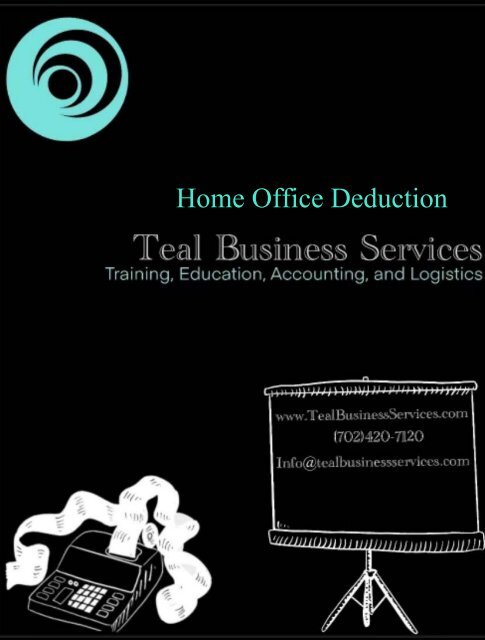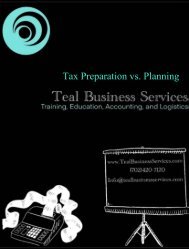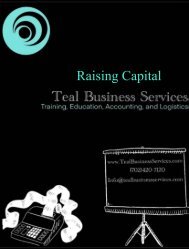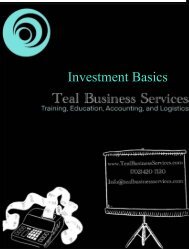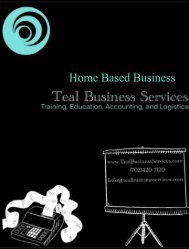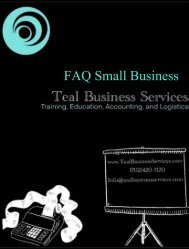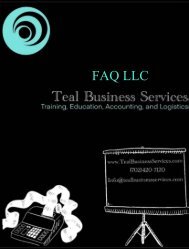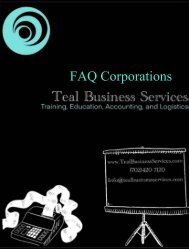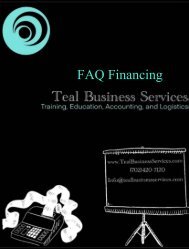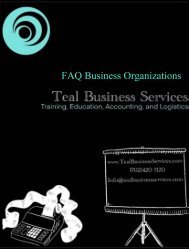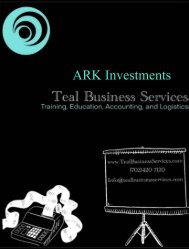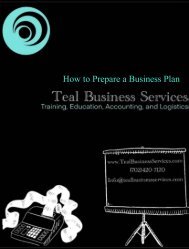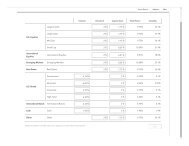Home office deduction
Create successful ePaper yourself
Turn your PDF publications into a flip-book with our unique Google optimized e-Paper software.
<strong>Home</strong> Office Deduction
Under the IRS rules, a taxpayer is allowed to deduct expenses related to business use of<br />
a home, but only if the space is used "exclusively" on a "regular basis." To qualify for a<br />
home <strong>office</strong> <strong>deduction</strong> you must meet one of the following requirements:<br />
1. Exclusive and regular use as your principal place of business<br />
2. A place for meeting with clients or customers in the ordinary course of business<br />
3. A place for the taxpayer to perform administrative or management activities<br />
associated with the business, provided there is no other fixed location from which<br />
the taxpayer conducts a substantial amount of such administrative or<br />
management activities<br />
A separate structure not attached to your dwelling unit that is used regularly and<br />
exclusively for your trade or profession also qualifies as a home <strong>office</strong> under the IRS<br />
definition.<br />
The exclusive-use test is satisfied if a specific portion of the taxpayer's home is used<br />
solely for business purposes or inventory storage. The regular-basis test is satisfied if the<br />
space is used on a continuing basis for business purposes. Incidental business use does<br />
not qualify.<br />
In determining the principal place of business, the IRS considers two factors: Does the<br />
taxpayer spend more business-related time in the home <strong>office</strong> than anywhere else? Are<br />
the most significant revenue-generating activities performed in the home <strong>office</strong>? Both of<br />
these factors must be considered when determining the principal place of business.<br />
Employees<br />
Note: Tax reform legislation passed in 2017 repealed certain itemized <strong>deduction</strong>s on<br />
Schedule A, Itemized Deductions for tax years 2018 through 2025, including employee<br />
business expense <strong>deduction</strong>s related to home <strong>office</strong> use.<br />
For tax years prior to 2018, employees could claim home <strong>office</strong> expenses as <strong>deduction</strong>s<br />
provided they met additional rules such as business use must also be for the<br />
convenience of the employer (not just the employee). To qualify for the home-<strong>office</strong><br />
<strong>deduction</strong>, an employee must satisfy two additional criteria.<br />
First, the use of the home <strong>office</strong> must be for the convenience of the employer (for<br />
example, the employer does not provide a space for the employee to do his/her job).<br />
Second, the taxpayer does not rent all or part of the home to the employer and use the<br />
rented portion to perform services as an employee for the employer. Employees who<br />
telecommute may be able to satisfy the requirements for the home-<strong>office</strong> <strong>deduction</strong>.
To qualify for the home-<strong>office</strong> <strong>deduction</strong>, an employee must satisfy two additional<br />
criteria. First, the use of the home <strong>office</strong> must be for the convenience of the employer<br />
(for example, the employer does not provide a space for the employee to do his/her<br />
job). Second, the taxpayer does not rent all or part of the home to the employer and use<br />
the rented portion to perform services as an employee for the employer. Employees<br />
who telecommute may be able to satisfy the requirements for the home-<strong>office</strong><br />
<strong>deduction</strong>.<br />
Expenses<br />
<strong>Home</strong> <strong>office</strong> expenses are classified into three categories:<br />
Direct Business Expenses relate to expenses incurred for the business part of your<br />
home such as additional phone lines, long-distance calls, and optional phone services.<br />
Basic local telephone service charges (that is, monthly access charges) for the first phone<br />
line in the residence generally do not qualify for the <strong>deduction</strong>.<br />
Indirect Business Expenses are expenditures that are related to running your home<br />
such as mortgage or rent, insurance, real estate taxes, utilities, and repairs.<br />
Unrelated Expenses such as painting a room that is not used for business or lawn care<br />
are not deductible.<br />
Deduction Limit<br />
You can deduct all your business expenses related to the use of your home if your gross<br />
income from the business use of your home equals or exceeds your total business<br />
expenses (including depreciation). But, if your gross income from the business use of<br />
your home is less than your total business expenses, your <strong>deduction</strong> for certain<br />
expenses for the business use of your home is limited.<br />
Nondeductible expenses such as insurance, utilities, and depreciation that are allocable<br />
to the business are limited to the gross income from the business use of your home<br />
minus the sum of the following:<br />
• The business part of expenses you could deduct even if you did not use your<br />
home for business (such as mortgage interest, real estate taxes, and casualty and<br />
theft losses that are allowable as itemized <strong>deduction</strong>s on Schedule A (Form<br />
1040)). These expenses are discussed in detail under Deducting Expenses, later.<br />
• The business expenses that relate to the business activity in the home (for<br />
example, business phone, supplies, and depreciation on equipment), but not to<br />
the use of the home itself.
If your <strong>deduction</strong>s are greater than the current year's limit, you can carry over the excess<br />
to the next year. They are subject to the <strong>deduction</strong> limit for that year, whether or not<br />
you live in the same home during that year.<br />
Sale of Residence<br />
If you use property partly as a home and partly for business, tax rules generally permit a<br />
$500,000 (married filing jointly) or $250,000 (single or married filing separately)<br />
exclusion on the gain from the sale of a primary residence provided certain ownership<br />
and use tests are met during the 5-year period ending on the date of the sale:<br />
• You owned the home for at least 2 years (ownership test), and<br />
• You lived in the home as your main home for at least 2 years (use test).<br />
If the part of your property used for business is within your home, such as a room used<br />
as a home <strong>office</strong> for a business there is no need to allocate gain on the sale of the<br />
property between the business part of the property and the part used as a home.<br />
However, if you used part of your property as a home and a separate part of it, such as<br />
an outbuilding, for business other rules apply such as whether the use test was met (or<br />
not met) for the business part and whether or not there was business use in the year of<br />
the sale.<br />
If you need more information about whether you qualify for the exclusion, please don't<br />
hesitate to call us.<br />
Simplified <strong>Home</strong> Office Deduction<br />
If you're one of the more than 3.4 million taxpayers claimed <strong>deduction</strong>s for business use<br />
of a home (commonly referred to as the home <strong>office</strong> <strong>deduction</strong>), don't forget about the<br />
new simplified option available for taxpayers starting with 2013 tax returns. Taxpayers<br />
claiming the optional <strong>deduction</strong> will complete a significantly simplified form.<br />
The new optional <strong>deduction</strong> is capped at $1,500 per year based on $5 a square foot for<br />
up to 300 square feet. Though homeowners using the new option cannot depreciate the<br />
portion of their home used in a trade or business, they can claim allowable mortgage<br />
interest, real estate taxes and casualty losses on the home as itemized <strong>deduction</strong>s on<br />
Schedule A. These <strong>deduction</strong>s need not be allocated between personal and business<br />
use, as is required under the regular method. Business expenses unrelated to the home,<br />
such as advertising, supplies and wages paid to employees are still fully deductible.
Current restrictions on the home <strong>office</strong> <strong>deduction</strong>, such as the requirement that a home<br />
<strong>office</strong> must be used regularly and exclusively for business and the limit tied to the<br />
income derived from the particular business, still apply under the new option.<br />
Tax Deductions<br />
The "home <strong>office</strong>" tax <strong>deduction</strong> is valuable because it converts a portion of otherwise<br />
nondeductible expenses such as mortgage, rent, utilities and homeowners insurance<br />
into a <strong>deduction</strong>.<br />
Remember however, that an individual is not entitled to deduct any expenses of using<br />
his/her home for business purposes unless the space is used exclusively on a regular<br />
basis as the "principal place of business" as defined above. The IRS applies a 2-part test<br />
to determine if the home <strong>office</strong> is the principal place of business.<br />
• Do you spend more business-related time in your home <strong>office</strong> than anywhere<br />
else?<br />
• Are the most significant revenue-generating activities performed in your home<br />
<strong>office</strong>?<br />
If the answer to either of these questions is no, the home <strong>office</strong> will not be considered<br />
the principal place of business, and the <strong>deduction</strong> cannot be taken.<br />
A home <strong>office</strong> also increases your business miles because travel from your home <strong>office</strong><br />
to a business destination--whether it's meeting clients, picking up supplies, or visiting a<br />
job site--counts as business miles. And, you can depreciate furniture and equipment<br />
(purchased new for your business or converted to business use), as well as expense new<br />
equipment used in your business under the Section 179 expense election.<br />
Taxpayers taking a <strong>deduction</strong> for business use of their home must complete Form 8829.<br />
If you have a home <strong>office</strong> or are considering one, please call us. We'll be happy to help<br />
you take advantage of these <strong>deduction</strong>s.


